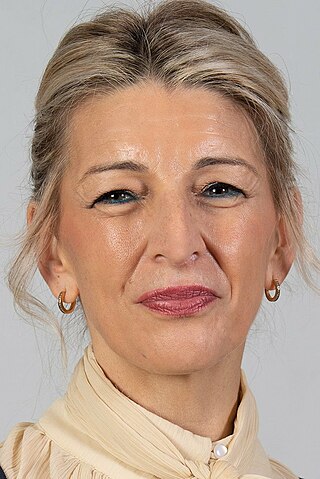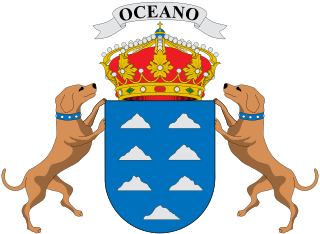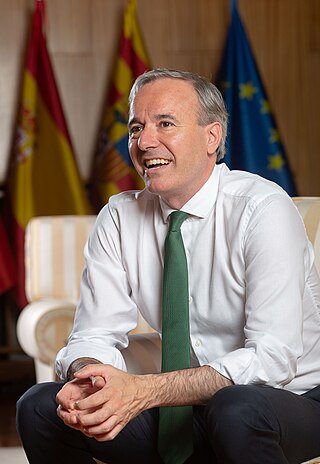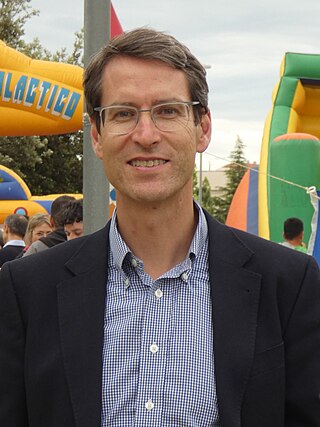List of officeholders
Office name:
- Vice Presidency of the Council of Ministers (1840–1841; 1925–1931; 1933–1934)
- Vice Presidency of the Government (1938–1939; 1962–1973; 1982–1995; 2011–2020)
- First Vice Presidency of the Government (1974–1975; 1976; 1977–1979; 1981–1982; 1996–2011; 2020–present)
- Vice Presidency of the Government for Defence Affairs (1975–1976)
- First Vice Presidency of the Government for Defence Affairs (1976–1977)
- First Vice Presidency of the Government, in charge of the Coordination of the Security and National Defence Affairs (1979–1981)
- Vice Presidency of the Government for Economic Affairs (1982; 2011)
| Portrait | Name (Birth–Death) | Term of office | Party | Government | Prime Minister (Tenure) | Ref. | ||||
|---|---|---|---|---|---|---|---|---|---|---|
| Took office | Left office | Duration | ||||||||
 | Joaquín María Ferrer (1777–1861) | 3 October 1840 | 10 May 1841 | 219 days | Progressive (Esparterist) | Espartero II | Baldomero Espartero  (1840–1841) | [1] [2] | ||
| Office disestablished during this interval. | ||||||||||
 | Severiano Martínez Anido (1862–1938) | 3 December 1925 | 30 January 1930 | 4 years and 58 days | Military | Civil Directory | Miguel Primo de Rivera  (1923–1930) | [3] [4] | ||
| Office disestablished during this interval. | ||||||||||
 | Diego Martínez Barrio (1883–1962) | 22 December 1933 | 3 March 1934 | 71 days | PRR | Lerroux II | Alejandro Lerroux  (1933–1934) | [5] [6] | ||
| Office disestablished during this interval. | ||||||||||
 | Francisco Gómez-Jordana (1876–1944) | 31 January 1938 | 9 August 1939 | 1 year and 190 days | National Movement (Military) | Franco I | Francisco Franco  (1938–1973) | [7] [8] | ||
| Office disestablished during this interval. | ||||||||||
 | Agustín Muñoz Grandes (1896–1970) | 11 July 1962 | 28 July 1967 | 5 years and 17 days | National Movement (Military) | Franco VI | Francisco Franco  (1938–1973) | [9] [10] | ||
| Franco VII | ||||||||||
 | Luis Carrero Blanco (1904–1973) | 22 September 1967 | 9 June 1973 | 5 years and 260 days | National Movement (Military) | [11] [12] | ||||
| Franco VIII | ||||||||||
 | Torcuato Fernández-Miranda (1915–1980) | 12 June 1973 | 31 December 1973 | 202 days | National Movement (Nonpartisan) | Carrero Blanco | Luis Carrero Blanco  (1973) | [13] | ||
 | José García Hernández (1915–2000) | 4 January 1974 | 12 December 1975 | 1 year and 342 days | National Movement (Nonpartisan) | Arias Navarro I | Carlos Arias Navarro  (1973–1976) | [14] [15] | ||
 | Fernando de Santiago (1910–1994) | 12 December 1975 | 5 July 1976 | 286 days | National Movement (Military) | Arias Navarro II | [16] [17] [18] | |||
| 8 July 1975 | 23 September 1976 | Suárez I | Adolfo Suárez  (1976–1981) | |||||||
 | Manuel Gutiérrez Mellado (1912–1995) | 23 September 1976 | 5 July 1977 | 4 years and 157 days | National Movement (Military) | [19] [20] [21] [22] | ||||
| 5 July 1977 | 6 April 1979 | Military | Suárez II | |||||||
| 6 April 1979 | 27 February 1981 | Suárez III | ||||||||
 | Rodolfo Martín Villa (born 1934) | 2 December 1981 | 30 July 1982 | 240 days | UCD | Calvo-Sotelo | Leopoldo Calvo-Sotelo  (1981–1982) | [23] [24] | ||
 | Juan Antonio García Díez (1940–1998) | 30 July 1982 | 3 December 1982 | 126 days | UCD | [25] [26] | ||||
 | Alfonso Guerra (born 1940) | 3 December 1982 | 26 July 1986 | 8 years and 42 days | PSOE | González I | Felipe González  (1982–1996) | [27] [28] [29] [30] | ||
| 26 July 1986 | 7 December 1989 | González II | ||||||||
| 7 December 1989 | 14 January 1991 | González III | ||||||||
 | Narcís Serra (born 1943) | 13 March 1991 | 14 July 1993 | 4 years and 111 days | PSC–PSOE | [31] [32] [33] | ||||
| 14 July 1993 | 2 July 1995 | González IV | ||||||||
| Office disestablished during this interval. | ||||||||||
 | Francisco Álvarez-Cascos (born 1947) | 6 May 1996 | 28 April 2000 | 3 years and 358 days | PP | Aznar I | José María Aznar  (1996–2004) | [34] [35] | ||
 | Mariano Rajoy (born 1955) | 28 April 2000 | 4 September 2003 | 3 years and 129 days | PP | Aznar II | [36] [37] | |||
 | Rodrigo Rato (born 1949) | 4 September 2003 | 18 April 2004 | 227 days | PP | [38] [39] | ||||
 | María Teresa Fernández de la Vega (born 1949) | 18 April 2004 | 14 April 2008 | 6 years and 186 days | Independent | Zapatero I | José Luis Rodríguez Zapatero  (2004–2011) | [40] [41] [42] | ||
| 14 April 2008 | 21 October 2010 | Zapatero II | ||||||||
 | Alfredo Pérez Rubalcaba (1951–2019) | 21 October 2010 | 12 July 2011 | 264 days | PSOE | [43] [44] | ||||
 | Elena Salgado (born 1949) | 12 July 2011 | 22 December 2011 | 163 days | Independent | [45] [46] | ||||
 | Soraya Sáenz de Santamaría (born 1971) | 22 December 2011 | 4 November 2016 | 6 years and 167 days | PP | Rajoy I | Mariano Rajoy  (2011–2018) | [47] [48] [49] | ||
| 4 November 2016 | 7 June 2018 | Rajoy II | ||||||||
 | Carmen Calvo (born 1957) | 7 June 2018 | 13 January 2020 | 3 years and 35 days | PSOE | Sánchez I | Pedro Sánchez  (2018–present) | [50] [51] [52] | ||
| 13 January 2020 | 12 July 2021 | Sánchez II | ||||||||
 | Nadia Calviño (born 1968) | 12 July 2021 | 21 November 2023 | 2 years and 170 days | Independent | [53] [54] [55] | ||||
| 21 November 2023 | 29 December 2023 | Sánchez III | ||||||||
 | María Jesús Montero (born 1966) | 29 December 2023 | Incumbent | 182 days | PSOE | [56] | ||||















